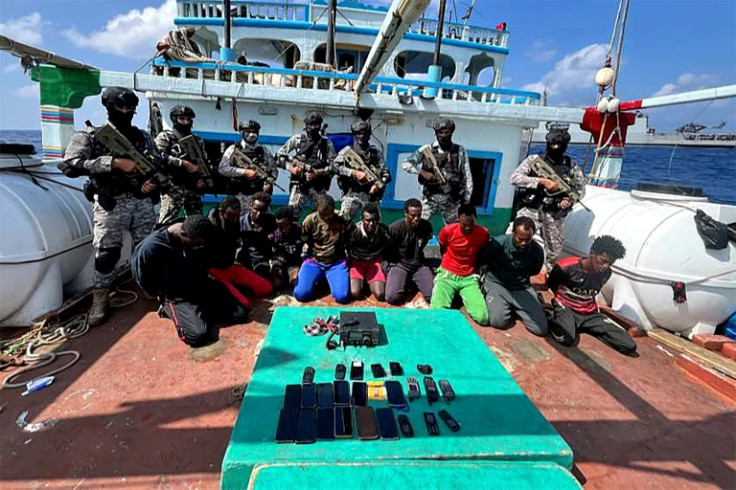
The daring attack in December bore unsettling hallmarks of the piracy that once terrorised global shipping off eastern Africa: a cargo vessel hijacked, its crew taken to Somalia, and disappeared.
The successful capture of the foreign vessel was the first by Somali pirates since 2017, and follows a spike in armed seaborne attacks around the Horn of Africa not seen in years.
Analysts caution that Somali piracy poses nowhere near the threat it did in 2011, when navies around the world had to deploy warships to beat back the scourge and restore order at sea.
But this recent upswing in pirate activity has raised further concerns about marine security and shipping at a time when crucial trade corridors off Yemen have come under siege.
The UK Marine Trade Operations, which monitors piracy, recorded six incidents off Somalia's coast since mid-December, from approaches by crews armed with machine guns and rocket launchers, to successful hijackings.
The MICA Center, a French maritime security agency, noted the "possible resurgence" of piracy off Somalia in a 2023 report. It recorded nine attacks over that year, describing the number as "novel".
Many of these incidents occurred off Puntland, the historic hub of Somali piracy. The northern state wraps around the Horn of Africa and boasts long coastlines on the Gulf of Aden and the Indian Ocean.
Eric Jaslin, Commander of the MICA Center, said the increase occurred "almost simultaneously" as Yemen-based Huthi rebels began targeting boats headed for Israel in retaliation for the war in Gaza between Israel and Hamas.
"Almost at the same time, we began to observe a phenomena of piracy against dhows off the coast of Puntland," he said, referring to the traditional wooden fishing boats that sail the Indian Ocean.
A number of dhow hijackings last year raised the possibility that Somalia's dormant crews could be "re-equipping" for attacks further out at sea, said Timothy Walker, a researcher at the Institute for Security Studies (ISS).
Somali pirates have traditionally sought to capture a "mother ship" -- a motorised dhow or fishing trawler -- capable of sailing greater distances where they can target larger vessels.
Since the Huthi attacks, many cargo ships have slowed down hundreds of miles out at sea to await instructions on whether to proceed to the Red Sea, Walker noted.
"It creates a hunting ground," he said.
These ships have become especially vulnerable as some foreign navies have relocated from the Indian Ocean to the Red Sea in response to the Huthi attacks, analysts say.
Local conditions in Somalia have also allowed pirates to regroup.
State elections in Puntland over December and January meant some coastal security positions were vacated, said Omar Mahmood, researcher at the International Crisis Group.
"These two reasons -- on land and offshore -- provided an opportunity for these criminal networks that have always been there," he told AFP.
Puntland's Marine Police Force did not respond to requests for comment from AFP.
In Eyl, a traditional pirate stronghold on Puntland's east coast, locals say fishing trawlers from Southeast Asia, Iran and Europe plundering seas off Somalia have stirred anger in coastal communities.
"The reason why the pirates are re-emerging is because of the widespread illegal fishing on the coast," said Ahmed Abdi Nuh, an elder from Eyl.
These attacks could still constitute piracy under global definitions and have surfaced time and again, experts say.
"A lot of justification for the pirates who were captured in the past was a kind of Robin Hood argument -- that they were actually preventing illegal fishing," Walker said.
Between January 29 and February 2 this year, four fishing boats were freed by the Indian and Seychellois navies after being hijacked, sometimes more than 800 nautical miles (1,500 kilometres) from the coast.
"The further away from Somalia the less likelihood for a connection to a fishing scenario," said Hans Tino Hansen, CEO of Danish maritime intelligence and security company Risk Intelligence.
Analysts played down fears the bad days of Somali piracy were back, stressing the presence of foreign navies had deterred once-wanton criminality at sea.
The overall number of piracy attacks has fallen sharply from a 2011 peak, when internal chaos in Somalia, and the absence of a coast guard, allowed pirates to hijack commercial ships and hold crews to ransom.
Since then a multinational naval force from as far afield as Japan, the UK and Brazil has brought muscle to patrols around Somalia, blunting this once-lucrative trade.
Compared to the early 2000s, navies have advanced systems for detecting pirate activity and merchant ships are more aware of the risks and familiar with security procedures.
Before the hijacking of the Maltese-flagged bulk carrier MV Ruen on December 14, no cargo vessel had been successfully boarded by Somali pirates since 2017, and before that 2012.
Mahmood said the recent uptick in pirate activity was "more likely to be a flare-up than full-fledged resurgence".
In Eyl, locals were doubtful too.
"There are warships patrolling the sea. I don't believe any pirate in their right mind would take the chance," said Ahmed Siyad, a fisherman in Eyl.







